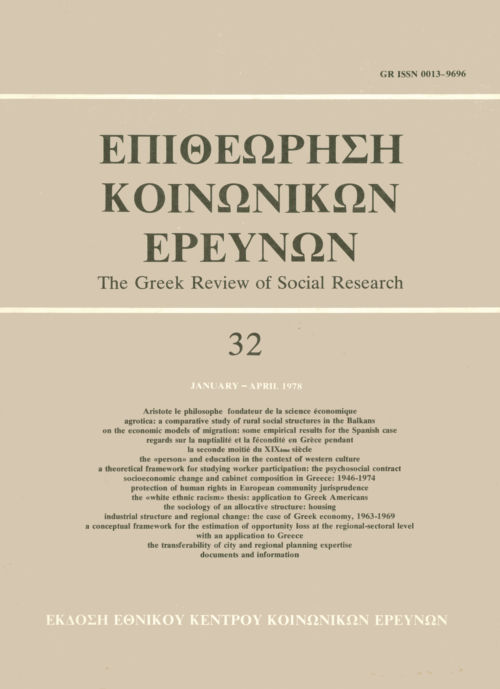Structural and personal factors contributing to job dissatisfaction in a large scale Greek organization of the service sector (Bank): A nationwide study of the attitudes and motivation of bank employees in Greece for the job of teller
Abstract
This is an exploratory study of a main issue in a large commercial bank in Greece. The research has been undertaken with the initiative of the Administration of a Greek Bank, ία an effort to define the reasons for reluctance οr unwillingness of the Bank's employees το accept the job of teller. The study also examines the impact of new technology, the kind and degree of adjustment imposed on tellers, i.e. their new work roles, the existing problems related to job satisfaction or dissatisfaction, and the weaknesses of the system. Thirty five Branches of the national network participated in the study with a sample of 427 employees of both sexes representing various geographical regions of Greece, various age groups of different educational. social and economic backgrounds and various grades within the Bank. Data were collected through questionnaires, which were supplemented by intensive personal interviewing. Combining the material from the questionnaires and the insights obtained by the personal interviews, we reached certain conclusions as to the response of bank employees το technical innovation and change in their traditional work roles. An analysis of the nature of the requirements of change introduced, the content and context of the new work roles, the individual characteristics, attitudes and perceptions of bank tellers, and various organizational dimensions, made clear that certain structural and personal factors contribute to Job Dissatisfaction, as a result of a new division of labor and new work roles which are required of a new technology. The findings of this study show that such factors must be taken into consideration in designing sociotechnical systems. Due to the scarcity of similar studies in Greece, we have no way to compare our findings. This work is therefore exploratory and constitutes an original sociological study of a large Greek organization. It is an attempt (a) to test, in the Greek setting, theoretical hypotheses developed by similar studies in foreign organizational settings; (b) to connect the Greek findings with the findings of the latter and to suggest crοss-cultural comparisons; (c) to develop better understanding of some organizational and human problems of large Greek organizations in the process of technological change; (d) to suggest similar research in industry and other service sectors or branches.
Article Details
- How to Cite
-
Nicolaou-Smokovitis, L. (1979). Structural and personal factors contributing to job dissatisfaction in a large scale Greek organization of the service sector (Bank): A nationwide study of the attitudes and motivation of bank employees in Greece for the job of teller. The Greek Review of Social Research, 35, 166–195. https://doi.org/10.12681/grsr.171
- Issue
- 1979: 35
- Section
- Articles

This work is licensed under a Creative Commons Attribution-NonCommercial 4.0 International License.
Authors who publish with this journal agree to the following terms:
- Authors retain copyright and grant the journal right of first publication with the work simultaneously licensed under a Creative Commons Attribution Non-Commercial License that allows others to share the work with an acknowledgement of the work's authorship and initial publication in this journal.
- Authors are able to enter into separate, additional contractual arrangements for the non-exclusive distribution of the journal's published version of the work (e.g. post it to an institutional repository or publish it in a book), with an acknowledgement of its initial publication in this journal.
- Authors are permitted and encouraged to post their work online (preferably in institutional repositories or on their website) prior to and during the submission process, as it can lead to productive exchanges, as well as earlier and greater citation of published work (See The Effect of Open Access).




